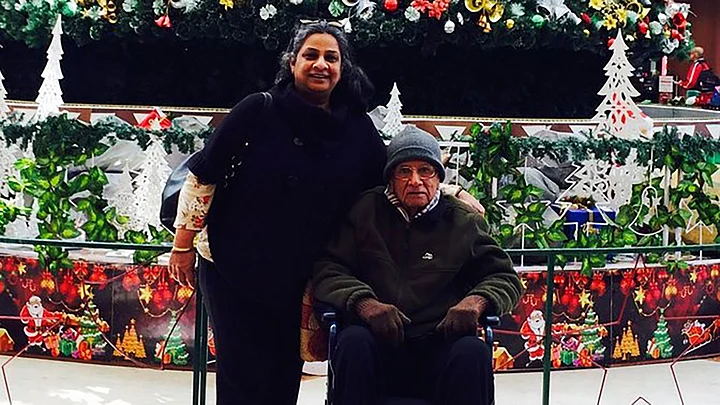My father-in-law, whom we call Daddy, is 91. Daddy visits my father, Anna, almost every evening. One day in the height of summer, Daddy dropped in just as Anna was scheduled to eat his evening portion of fruit. More often than not, the fruit is papaya as it is one of the best ways to manage his chronic constipation. With the advent of summer, we switched to melon. It is full of fibre and water. But more importantly, it is sweet and we all know how Anna loves sweet things.
I joke with Daddy that Anna is very happy these days. He does not have to eat the dreaded papaya. And the icing on the cake is that he gets a sugar high after his portion of sweet melon. Anna dislikes the papayas we get here in Delhi – they are just not sweet and soft enough for him.
Daddy takes the papaya conversation seriously and gives Anna a rundown on why papaya is the healthier option. “Papaya is a rich source of vitamin C, fibre and antioxidants like carotene,” he says while conceding that melons are better in summer as they are “cooling”.
Anna, of course, latches onto the word carotene and changes the subject to how carrots also have fibre and carotene.
He then goes on to tell us the story of Eric Beyrodt who hated carrots.
In 1954, Eric Beyrodt came to India as a part of a technical assistance program run by the Ford Foundation in developing countries. Anna was then a Deputy Development Officer posted in New Delhi. Eric was an expert on leather technology and its use in the footwear industry and Anna worked with Eric closely. He stayed in India for 8 years helping the GOI build the leather footwear industry.
During his first winter in Delhi and Agra, Anna noticed that Eric Beyrodt never ate carrots. Anyone who has lived in north India knows that the carrots in winter are the best – deep red and sweet. We eat carrots as if they’re going out of fashion – in salads, as sabzi (cooked vegetable), in halwa (the Indian, much sweeter, version of carrot cake).
So one day, Anna, noticing that Eric removed all the carrots from his portion of gajar mattar (carrot and peas) sabzi, asked him why he did not eat carrots at all.
Eric then revealed to Anna that he was a tail gunner in the German Air Force in World War II. He was shot down over north Africa in the early part of the war and spent nearly four years as a Prisoner of War (PoW).
As a PoW, all he got to eat was carrots. Carrots for breakfast, lunch and dinner – when he got to eat, that is! Carrots to grow and harvest. Carrots to peel and cook. He just could not stand them anymore. They also brought back memories of Nazi Germany and the war. He was just a young man, a couple of years older than Anna. A young man who joined the war because his country was at war. He was not a Nazi. He was just a citizen who got caught up in the war and spent years as a PoW.
This story is so interesting that we forget all about constipation and its cure, papaya. Anna wins this round, hands down.
Dealing With Constipation in Patients With Parkinson’s Disease
Constipation is a common problem for patients with Parkinson’s Disease. It may occur due to the improper functioning of the autonomic nervous system – the system that is responsible for regulating smooth muscle activity.
Here’s what helps us manage Anna’s constipation:
- Eating at least 2 portions of fruit every day. Papaya/melon/pomegranate is a must.
- Eating at least 2 portions of vegetables. Raw salad added to at least one meal.
- Drinking lots of water. We measure his water intake and urine output daily.
- Exercise. Walking at least 2 times a day helps.
- Stool softener. He has a mild softener every day. It just helps ease the way.
- When the situation reaches the ‘danger stage’ i.e. 3/4 days without a movement, then a sure-fire way to solve the problem is to cook him a meal of besan ka cheela (crepes made from gluten-free chickpea flour) and a green fibre-rich vegetable like spinach.
Come to think of it, this is exactly what people, with or without Parkinson’s Disease need to do to prevent constipation. So what’s unique for a Parkinson’s patient?
- 1. It’s a monitor and control every meal, every day activity. Healthy people can take a break once a while and eat low fibre stuff, a Parkinson’s patient can not.
- 2. Exercise is harder for people with Parkinson’s and hence we need to balance cajoling, motivating, and forcing them to exercise.
(After working in corporate India for over 29 years, Sangeeta has taken time off to look after her father, who was diagnosed with Parkinson’s Disease in 2008. Sangeeta hopes that these authentic stories will help patients and caregivers understand and appreciate the impact of Parkinson’s Disease. You can follow Sangeeta’s blog here.)
